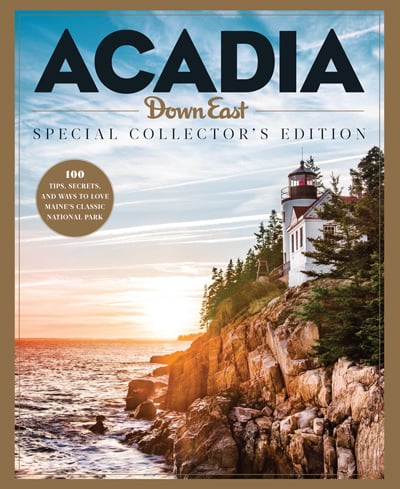By Kathryn Miles
Illustration by Christine Mitchell Adams
From our Acadia: Special Collector’s Edition

On a warm August day in 1901, a dozen guests made their way into the music room of rusticator Caroline Bristol’s MDI cottage. Their host, Harvard University President Charles W. Eliot, had been clear in his invite: this meeting was urgent. Already, the new century had brought with it immeasurable challenges: political unrest overseas, economic turmoil, rapid development that threatened the country’s wild spaces. In cities like New York and Philadelphia, the tenements could barely hold the influx of impoverished immigrants and recently unemployed agricultural workers. The United States, Eliot told his guests, was a country in need of healing. And Eliot knew how to heal it.
The patrician university president had inherited a love of the outdoors from his late son, a pioneering landscape architect, and had experienced firsthand the cathartic benefits of the country’s national parks: Yosemite, Yellowstone, Mount Rainier. But they were all out of reach for America’s working class, most of whom dwelt on the Eastern Seaboard. What the country needed, Eliot felt, was a natural wonderland more accessible to the urban masses, and he was certain that Mount Desert Island was that place.
Call it Crazy Idea #1: the notion that access to wild places can make Americans better and stronger.
That afternoon in the music room, Eliot and his guests hatched Crazy Idea #2: they would simply ask the island’s wealthiest landowners to give up parcels of their land so the hoi polloi could come enjoy it — eventually, as a national park. Eight of Eliot’s guests agreed to form a board to oversee the effort, and Eliot chose George Buckingham Dorr to serve as the organization’s de facto head.
On the surface, Dorr seemed like an odd choice to spearhead such an egalitarian campaign. He was a quintessential Boston Brahmin, born into a textile fortune and a life of privilege. His outdoor interests were founded on his love of grand European gardens, and his family had built one of MDI’s immense summer cottages.
But Eliot saw more to the 47-year-old Dorr. The Eliots and the Dorrs had summered together on MDI since George’s childhood, and Eliot, born with a conspicuous birthmark on his cheek, had always felt a fellow underdog’s affinity for the bookish boy, who spoke with a severe stutter. After Dorr graduated from Harvard, Eliot had tasked the young aristocrat with overseeing the expansion of Harvard Yard and the school’s centenary celebration of Ralph Waldo Emerson. In both instances, Dorr had excelled as a leader.
What’s more, Dorr was a year-round MDI resident, and Eliot, who spent nine months of the year back in Boston, banked on his protégé’s social connections. Wisely, it turned out: Dorr proved gifted at fundraising and PR and was a genius at political negotiation. He used his upper-crust credentials to glide into closed-door meetings and arrange hearings with senior officials. He schmoozed land donations and sales from his well-to-do neighbors. When World War I shifted Congress’s priorities away from conservation and public lands, Dorr personally persuaded President Woodrow Wilson to use executive authority to confer national monument status instead.
“This was one of America’s first major experiments in philanthropic giving,” says Ronald Epp, author of the new Dorr biography Creating Acadia National Park. “The land in question was held by the elite. Dorr was able to nudge away parcels of land and convince them that they could donate that land without posing a threat to their way of life — and he had the vision to see how those parcels could be connected into a park available to everyone, regardless of their class. He democratized the island.”
If Dorr forever changed MDI, the island’s wildness also changed Dorr. By the 1910s, he’d abandoned early visions of rose gardens and pony cart trails and instead wrote eloquently about the dangers of extinction and resource scarcity, even suggesting that wild places have spiritual value transcending these considerations. “Save your woods, not only because they are one of your great natural resources,” he wrote, “but also because they are a source of beauty which once lost can never be recovered.”
He knew when to wield his privilege and when to walk away from it: Dorr served as the park’s first superintendent until he died nearly penniless in 1944, having all but bankrupted himself in his quest to preserve MDI’s wild beauty, buying parcel after parcel for donation to the National Park Service. Once an awkward young blueblood, Dorr became, in old age, a contented and much-beloved sage of nature and simplicity — proving that wild places can be not only restorative, but also transformative. Call that Crazy Idea #3.




